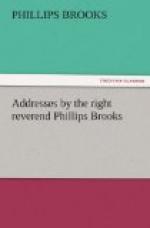shut your eyes to certain facts, you not simply say
an infinitely absurd and foolish thing, but you dishonor
your human life if you say that you have done in any
day of your life or in all the days of your life put
together, the very best that you could, or been the
very best man that you could be. You! what are
you? Again I say, The child of God, and this
which you have been, what is it? Look over it,
see how selfish it has been, see how material it has
been, how it has lived in the depths when it might
have lived on the heights, see how it has lived in
the little narrow range of selfishness when it might
have been as broad as all humanity, nay, when it might
have been as the God of humanity. Don’t
dare to say that in any day of your life, or in all
your life together, you have done the best that you
could. The Pharisee said it when he went up into
the temple, and all the world has looked on with mingled
pity and scorn at the blindness of the man who stood
there and paraded his faithfulness; while all the
world has bent with a pity that was near to love,
a pity that was full of sympathy because man recognized
his condition and experience, for the poor creature
grovelling upon the pavement, unwilling and unable
even to look upon the altar, but who, standing afar
off, said, “God be merciful to me a sinner!”
Whatever else you say, don’t say, “I have
been the very best I could.” That means
that you have not merely lived in the rooms of your
imprisonment, but that you have been satisfied to
count them the only possible rooms of your life, and
that the great halls of your liberty have never opened
themselves before you. Shall not they open themselves
somehow to us to-day, my friends? Shall we not
turn away from this hour and go back into our business,
into our offices, into the shops, into the crowded
streets, bearing new thoughts of the lives that we
might live, feeling the fetters on our hands and feet,
feeling many things as fetters which we have thought
of as the ornament and glory of our life, determined
to be unsatisfied forever until these fetters shall
be stricken off and we have entered into the full
liberty which comes to those alone who are dedicated
to the service of God, to the completion of their own
nature, to the acceptance of the grace of Christ,
and to the attainment of the eternal glory of the
spiritual life, first here and then hereafter, never
hereafter, it may be, except here and now, certainly
here and now, as the immediate, pressing privilege
and duty of our lives? So let us stand up on
our feet and know ourselves in all the richness and
in all the awfulness of our human life. Let us
know ourselves children of God, and claim the liberty
which God has given to every one of his children who
will take it. God bless you and give some of you,
help some of us, to claim, as we have never claimed
before, that freedom with which the Son makes free!




